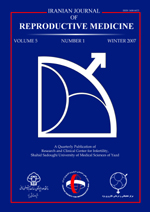
|
International Journal of Reproductive BioMedicine
Research and Clinical Center for Infertility, Shahid Sadoughi University of Medical Sciences of Yazd
ISSN: 1680-6433
EISSN: 1680-6433
Vol. 14, No. 2, 2016, pp. 81-88
|
 Bioline Code: rm16011
Bioline Code: rm16011
Full paper language: English
Document type: Research Article
Document available free of charge
|
|
|
International Journal of Reproductive BioMedicine, Vol. 14, No. 2, 2016, pp. 81-88
| en |
Effect of body weight on serum homocysteine level in patients with polycystic ovarian syndrome: A case control study
Gareeb, Ali I. Al-; Amieer, Wafaa Salah Al-; Alkuraishy, Hayder M. & Mayahi, Thabat J. Al-
Abstract
Background: Polycystic ovarian syndrome (PCOS) represent one of the common
endocrine disorders which influence around 8% of reproductive women whom
usually suffering from obesity and increase cardiovascular risk. Serum
homocysteine levels are associated with bad impact on endothelial functions and
considered as an independent risk factor for cardiovascular disease.
Objective: The aim was to study the level of plasma homocysteine in obese and non-obese Iraqi patients with PCOS.
Materials and Methods: This study was carried out on 207 women. Of theme, 101 women with PCOS and 106 PCOS- free women served as controls. Blood sample was taken from each participant on the 2nd day of menstruation morning after an overnight fasting. Serum levels of follicle-stimulating hormone (FSH), luteinizing hormone (LH), free testosterone and androstenedione were measured. Moreover, total lipid profile and plasma homocysteine levels were measured in both groups.
Results: Sixty percent of PCOS women were overweight or obese and 56% of them had a waist circumference >88cm. Moreover plasma homocysteine concentrations were found to be higher in patients with PCOS (11.5±5.41μmol/L) as compared with control (8.10±1.89 μmol/L) (p<0.002). Furthermore the homocysteine concentrations were 13.19±5.97 μmol/L and 9.38±2.99 μmol/L in both obese and normal-weight PCOS women respectively which was significantly higher than obese (p<0.002) and normal-weight (p<0.004) control women.
Conclusion: Increase in body weight is not an independent risk factor to increase plasma homocysteine levels in PCOS women.
Keywords
Homocysteine; Body weight; Polycystic ovarian syndrome
|
| |
© Copyright 2016 - International Journal of Reproductive Medicine
Alternative site location: http://www.ijrm.ir
|
|
